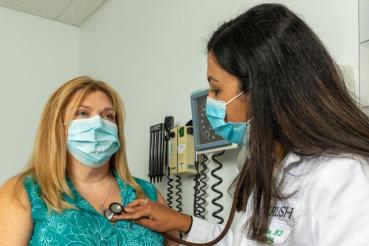Diabetes, obesity and high blood pressure are common links to heart disease.
But many people develop heart disease having none of these risk factors. Now researchers are looking beyond the obvious.
“If we can figure out other reasons people are developing heart disease, we can create new ways to fight heart disease,” says Melissa Tracy, MD, a cardiologist at Rush.
Doing the following three things can not only help prevent heart disease, but keep you healthier in general:
1. Brush your teeth routinely.
Brushing and flossing regularly and visiting the dentist twice a year can prevent endocarditis, a serious condition in which bacteria from the bloodstream causes infection of the heart valves with subsequent destruction of the infected valves.
In the past, dentists gave all patients antibiotics before and after many dental procedures to lower the risk of infection and endocarditis.
Current research, however, now promotes good dental hygiene as more effective for preventing endocarditis than antibiotics in people without high risk conditions, such as congenital heart disease and those who have had a heart transplant or a pacemaker.
2. Take vitamin C.
Vitamin C helps the body produce collagen, a protein needed for healthy blood vessels.
“Without enough vitamin C, people may have problems with the stability of their blood vessels, which can lead to cardiovascular disease,” says Tracy.
Doctors recommend 500 to 700 mg of vitamin C daily to help stave off heart disease. Supplements can help, but it’s better to get your vitamin C through foods like oranges, kiwi, broccoli and kale.
3. Ditch plastics with BPA.
Bisphenol A (BPA) is a compound used to make certain plastics that has been linked to possible neurological and behavioral problems. Some studies have now found that children exposed to high levels of BPA have increased risks of heart disease.
Opt for BPA-free products; and never microwave or heat up anything in plastic because the heat can cause the plastic to break down and the BPA to leech onto the foods, says Tracy.
As people become more aware of the lesser-known heart disease risks, they can protect their heart to the fullest.




